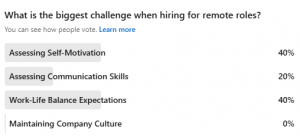With the boom of the tech industry comes a boom in the types of jobs available to clients and recruiters alike. Candidates are no longer required to sit in-office for 8 hours a day; rather, their 8 hours could arguably be better spent at home, using their time to complete their tasks as they see fit.
Choosing to work remotely can offer a slew of benefits. However, gauging which candidates are dedicated and which candidates are simply looking for the lowest effort with the highest reward can be difficult to determine over a computer screen. So, we did the heavy work for you. We asked our top recruiters: What’s the number one thing they’re watching for when evaluating remote candidates? To our surprise, two specific traits took the cake.

First is assessing a candidate’s determination. Determination refers to the ability to get things done without having a supervisor or a manager constantly checking on you or telling you what to do and it is the most important factor rather than relying on motivation. When doing remote work, there is no HR or Supervisor to come and ask you how your tasks are progressing, so the candidate must be capable of assessing a task’s urgency.
It’s you and Microsoft Teams against the world. Thus, hiring managers need to be able to accurately assess which candidates work well independently and which can maintain good communication via technology, as remote work requires.
The second trait that recruiters specified they look for is evaluating a candidate’s ability to maintain a healthy work life balance.
The work-life balance recruiters are looking for refers to an employee’s ability to manage their time and energy so that their work doesn’t take over their entire life.
It is a common misconception that companies want employees who work long and unnecessary hours. The truth is they don’t. Working for working’s sake is ineffective and costly in the long run, often leading to employee burnout and inconsistent results. A productive employee knows when to stop and take a break.
Though these two traits were labeled some of the most important skills when hiring remotely, These traits can be difficult to evaluate with accuracy, especially in a virtual setting. Despite what a candidate says and claims, it is hard to truly gauge one’s soft skills without seeing them live in action. There are nuances that simply have to be observed. Additionally, one’s own interpretation of their skills is not always the most accurate. Recruiters are also tasked with noting the difference between what candidates say and how candidates operate remotely.
The key takeaway? Don’t just look for qualifications and technical skills. It is the soft skills that will ensure longevity and a good cultural fit within a company. Ask the right questions. Do the proper research. Refine your evaluation process.
At USPRO, we understand that hiring for remote roles comes with new challenges—but also new opportunities. Over the last decade, we’ve built trusted relationships with leaders in defense, engineering, and IT who count on us for reliable, self-motivated talent that fits today’s flexible work models. When you partner with USPRO, you’re not just applying for a job—you’re tapping into a nationwide network that values strong connections and future-forward hiring.
Let us help you find the right remote role—and the right team. Contact USPRO today and take the next step with a partner who gets it.
